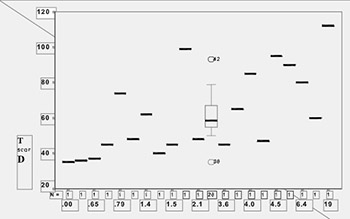Assessment of chronic neuropsychological effects of mercury vapour poisoning in chloral-alkali plant workers
DOI:
https://doi.org/10.17305/bjbms.2002.3578Keywords:
poisoning to mercury vapour, chloral-alkali plant workers, neuropsychological consequencesAbstract
A prospective case study was conducted in the Department of Occupational Medicine, Tuzla. The purpose of this study was to indicate negative effects from occupational exposure to mercury on behavioural and mental health, memory and psychomotor function that was tested in 46 chloral-alkali plant workers (mean age was 38. 8+/- 5. 7 years; mean age of occupational history 16. 5+/- 6. 0 years). Data on toxicological monitoring on atomic absorption spectrometer, and data on mental health were collected, psychiatric and other subjective symptoms, and behavioural, psychomotor and memory function tested. The data were compared to control group, 32 healthy non exposed workers. The study was designed to assess blood and urine mercurylevels and length of occupational exposure and investigate its relationships to effects on the mental health. The mean air mercury levels were 0.23 mg/m3, the mean blood mercury concentrations was 3. 6 mg/ dl and the mean urine mercuryconcentrations were 151.7 +/- 180.4 mg/l. In 25 (53%) workers exposed to mercury vapour was identified Depression-Hypochondrias Syndrome (p trend < 0. 001) with higher scores for scales: Hysteria (p trend <0. 001), Schizoid and Psychoastenia (MMPI). All psychological parameters were in highly significantly correlations with mercury levels and length of occupational exposure. Pathological parameters were possible general identified if the concentration of blood mercury levels are >2. 9 mg/ dl, or urine mercury levels > 87 mg/l workers exposed to mercury vapour knew that toxic effects in body resulted in loosing some of intellectual abilities, and that people who handle chemicals had an increased health risk (ESW questionnaire). The occupational mercury exposed workers had introvert behaviour (EPQ). Aggressiveness was found in 71.7% workers. The cognitive disturbances: short-term memory loss, difficult to concentrate on tasks which require attention and thinking, were significantly differed compared to those of controls (p trend < 0. 001). In 24 (52%) exposed to mercury workers we have determined ego strength loss and regressive defensive mechanisms (LB). Handwriting disturbances-micrography we have identified in 27 (58.7%) workers.
Citations
Downloads

Published
How to Cite
Accepted 2018-05-06
Published 2002-02-20









